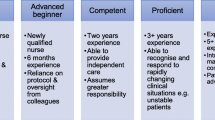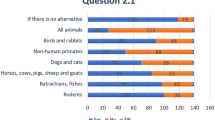Abstract
Veterinarians play a critical role in providing nutrition consultation and supporting clients to adopt healthy dietary habits for their pets; thus applicable, informative nutrition education in veterinary schools is essential. The aim of this study was to explore incoming veterinary students’ perceived importance, emphasis, and confidence in the veterinary nutrition education they will receive. First-year veterinary students at all 5 Canadian and 5 randomly selected US veterinary schools were invited to complete a 31-item questionnaire. Response rate was 34.6% (n = 326). Descriptive statistics and multivariate logistic regression were performed. While most students (92%) considered nutrition education to be an important component of veterinary training, 64% felt it will not be a subject of great emphasis. Veterinary students at schools with a board-certified veterinary nutrition faculty were more likely to perceive higher emphasis on nutrition education (p < 0.001). In the multivariate analysis, academic self-efficacy was a positive predictor of students’ perceived confidence in how well they anticipate their nutrition education that will prepare them for their clinical roles (p = 0.003). Examining the perceptions of veterinary students entering veterinary school is an important aspect to consider in the design and delivery of a veterinary nutrition curriculum and maybe equally important for students entering other professional health programs.

Similar content being viewed by others
References
Becvarora I, Prochazka D, Chandler ML, Meyer H. J. Nutrition education in European veterinary schools: are European veterinary graduates competent in nutrition? J Vet Med Educ. 2016;43(4):349–58.
Abood SK. Teaching and assessing nutrition competence in a changing curricular environment. J Vet Med Educ. 2008;35(2):281–7.
Roberts JL, Murray J. Survey of equine nutrition: perceptions and practices of veterinarians in Georgia, USA. J Equine Vet Sci. 2013;33(6):454–9.
Baldwin K, Buffington T, Freeman LM, Grabow M, Legred J. AAHA nutritional assessment guidelines for dogs and cats. J Am Anim Hosp Assoc. 2010;46:285–96.
AAHA. The path to high-quality care: practical tips for improving compliance. American Animal Hospital Association: Lakewood, CO; 2003.
Kogan LR, Schoenfeld-Tacher R, Simon AA, Viera AR. The internet and pet health information: perceptions and behaviors of pet owners and veterinarians. Internet Med. 2010;8(1):1–19.
Michel KE, Willoughby KN, Abood SK, Fascetti AJ, Fleeman LM, Freeman LM, et al. Attitudes of pet owners toward pet foods and feeding management of cats and dogs. J Am Vet Med Assoc. 2008;233(11):1699–703.
Freeman LM, Chandler ML, Hamper BA, Weeth LP. Current knowledge about the risks and benefits of raw meat-based diets for dogs and cats. J Am Vet Med Assoc. 2013;243(11):1549–58. https://doi.org/10.2460/javma.243.11.1549.
Flocke A, Thiemeyera H, Kiefer-Hecker B, ESVCN. Dog and cat nutrition practices of owners visiting veterinary clinics. In: Proceedings of the 17th Congress of the Ghent Belgium; 2013. p. 19–21.
Biele H. Dig into pet nutrition. Vet Econ. 2013;54(4):22–6.
Buffington CA, LaFlamme DP. A survey of veterinarians' knowledge and attitudes about nutrition. J Am Vet Med Assoc. 1996;208(5):674–5.
Nutrition ACoV. Individualized consultation with a board certified veterinary nutritionist. 2019. https://secure.balanceit.com/info/acvnecvcn.php? Accessed March 2 2019.
German AJ. The growing problem of obesity in dogs and cats. J Nutr. 2006;136(7 Suppl):1940S–6S. https://doi.org/10.1093/jn/136.7.1940S.
Gramlich LM, Olstad DL, Nasser R, Goonewardene L, Raman M, Innis S, et al. Medical students’ perceptions of nutrition education in Canadian universities. Appl Physiol Nutr Me. 2010;35(3):336–43. https://doi.org/10.1139/H10-016.
DiMaria-Ghalili RA, Mirtallo JM, Tobin BW, Hark L, Van Horn L, Palmer CA. Challenges and opportunities for nutrition education and training in the health care professions: intraprofessional and interprofessional call to action. Am J Clin Nutr. 2014;99(5 Suppl):1184S–93S.
Spencer EH, Frank E, Elon LK, Hertzberg VS, Serdula MK, Galuska DA. Predictors of nutrition counseling behaviors and attitudes in US medical students. Am J Clin Nutr. 2006;84(3):655–62. https://doi.org/10.1093/ajcn/84.3.655.
Laschinger HK, Tresolini CP. An exploratory study of nursing and medical students health promotion counselling self-efficacy. Nurse Educ Today. 1999;19(5):408–18. https://doi.org/10.1054/nedt.1999.0326.
Hailikari T, Katajavuori N, Lindblom-Ylanne S. The relevance of prior knowledge in learning and instructional design. Am J Pharm Educ. 2008;72(5):113.
Dogruer N, Eyyam R, Menevis I. The use of the internet for educational purposes. Procedia Soc Behav Sci. 2011;28:606–11.
Gore PA. Academic self-efficacy as a predictor of college outcomes: two incremental validity studies. Journal of Career Assessment. 2006;14(1):92–115. https://doi.org/10.1177/1069072705281367.
Lombardi K. Self-efficacy and nutrition knowledge of parents in Western Australia [thesis]. Perth, Australia: Edith Cowan University; 2013.
Goldstein H, Browne W, Rasbash J. Partitioning variation in multilevel models. Underst Stat. 2002;1(4):223–31.
AAVMC. Annual data report: a report of the Association of American Veterinary Medical Colleges. Association of American Veterinary Medical Colleges: NW; 2016.
Perlstein R, McCoombe S, Macfarlane S, Bell AC, Nowson C. Nutrition practice and knowledge of first-year medical students. J Biomed Educ. 2017:1–10.
Adams KM, Lindell KC, Kohlmeier M, Zeisel SH. Status of nutrition education in medical schools. Am J Clin Nutr. 2006;83(4):Suppl:):941–4.
Bandura A. Social learning through imitation. University of Nebraska Press: Lincoln; 1962.
Schunk DH. Self-efficacy and academic motivation. Educ Psych. 1991;26(3–4):207–31. https://doi.org/10.1207/s15326985ep2603&4_2.
Schunk DH, Mullen C. Handbook of research on student engagement. New York, NY: Springer Science + Business Media; 2012. p. 219–35.
Pintrich P, De Groot E. Motivational and self-regulated learning components of classroom academic performance. J Educ Psych. 1990;82(1):33–40.
Artino AR Jr. Academic self-efficacy: from educational theory to instructional practice. Perspect Med Educ. 2012;1(2):76–85. https://doi.org/10.1007/s40037-012-0012-5.
Mogre V, Aryee PA, Stevens FCJ, Scherpbier AJ. Future doctors’ nutrition-related knowledge, attitudes and self-efficacy regarding nutrition Care in the General Practice Setting: a cross-sectional survey. Med Sci Educ. 2017;27(3):481–8.
Bandura A. Self-efficacy in changing societies. New York, NY: Cambridge University Press; 1995.
Pajares F. Self-efficacy beliefs in academic settings. Rev Educ Res. 1996;66(4):543–78. https://doi.org/10.2307/1170653.
Mihalynuk TV, Scott CS, Coombs JB. Self-reported nutrition proficiency is positively correlated with the perceived quality of nutrition training of family physicians in Washington state. Am J Clin Nutr. 2003;77(5):1330–6.
Author information
Authors and Affiliations
Corresponding author
Ethics declarations
Conflict of Interest
On behalf of all authors, the corresponding author states that there is no conflict of interest.
Ethical Approval
All procedures performed this study were approved by the University of Guelph Research Ethics Board (REB#16JA039) and are in accordance with the 1964 Helsinki declaration and its later amendments or comparable ethical standards.
Informed Consent
Informed consent was obtained from all individual participants included in the study.
Additional information
Publisher’s Note
Springer Nature remains neutral with regard to jurisdictional claims in published maps and institutional affiliations.
Electronic Supplementary Material
ESM 1
(DOCX 20 kb)
Rights and permissions
About this article
Cite this article
Kamleh, M.K., Khosa, D.K., Dewey, C.E. et al. The Perceived Importance, Emphasis, and Confidence in Veterinary Nutrition Education of First-Year Canadian and US Veterinary Students. Med.Sci.Educ. 30, 323–330 (2020). https://doi.org/10.1007/s40670-019-00908-w
Published:
Issue Date:
DOI: https://doi.org/10.1007/s40670-019-00908-w




